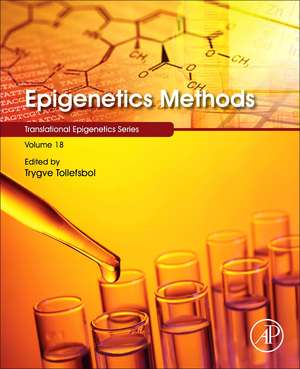Epigenetics Methods: Translational Epigenetics, cartea 18
Editat de Trygve O. Tollefsbolen Limba Engleză Paperback – 2 iul 2020
Epigenetics Methods offers comprehensive instruction in methods, protocols, and experimental approaches applied in field of epigenetics. Here, across thirty-five chapters, specialists offer step-by-step overviews of methods used to study various epigenetic mechanisms, as employed in basic and translational research. Leading the reader from fundamental to more advanced methods, the book begins with thorough instruction in DNA methylation techniques and gene or locus-specific methylation analyses, followed by histone modification methods, chromatin evaluation, enzyme analyses of histone methylation, and studies of non-coding RNAs as epigenetic modulators. Recently developed techniques and technologies discussed include single-cell epigenomics, epigenetic editing, computational epigenetics, systems biology epigenetic methods, and forensic epigenetic approaches. Epigenetics methods currently in-development, and their implication for future research, are also considered in-depth.
In addition, as with the wider life sciences, reproducibility across experiments, labs, and subdisciplines is a growing issue for epigenetics researchers. This volume provides consensus-driven methods instruction and overviews. Tollefsbol and contributing authors survey the range of existing methods; identify best practices, common themes, and challenges; and bring unity of approach to a diverse and ever-evolving field.
- Includes contributions by leading international investigators involved in epigenetic research and clinical and therapeutic application
- Integrates technology and translation with fundamental chapters on epigenetics methods, as well as chapters on more novel and advanced epigenetics methods
- Written at verbal and technical levels that can be understood by scientists and students alike
- Includes chapters on state-of-the-art techniques such as single-cell epigenomics, use of CRISPR/Cas9 for epigenetic editing, and epigenetics methods applied to forensics
Din seria Translational Epigenetics
- 18%
 Preț: 553.82 lei
Preț: 553.82 lei - 19%
 Preț: 659.12 lei
Preț: 659.12 lei - 23%
 Preț: 1206.43 lei
Preț: 1206.43 lei - 28%
 Preț: 915.82 lei
Preț: 915.82 lei - 24%
 Preț: 519.00 lei
Preț: 519.00 lei - 9%
 Preț: 783.84 lei
Preț: 783.84 lei - 23%
 Preț: 824.68 lei
Preț: 824.68 lei - 26%
 Preț: 949.33 lei
Preț: 949.33 lei - 27%
 Preț: 924.87 lei
Preț: 924.87 lei - 27%
 Preț: 804.68 lei
Preț: 804.68 lei - 27%
 Preț: 919.72 lei
Preț: 919.72 lei - 23%
 Preț: 918.41 lei
Preț: 918.41 lei - 28%
 Preț: 910.33 lei
Preț: 910.33 lei - 24%
 Preț: 956.09 lei
Preț: 956.09 lei - 26%
 Preț: 694.46 lei
Preț: 694.46 lei - 19%
 Preț: 833.02 lei
Preț: 833.02 lei - 27%
 Preț: 848.75 lei
Preț: 848.75 lei - 24%
 Preț: 846.30 lei
Preț: 846.30 lei - 22%
 Preț: 684.94 lei
Preț: 684.94 lei - 23%
 Preț: 794.89 lei
Preț: 794.89 lei - 24%
 Preț: 799.69 lei
Preț: 799.69 lei - 22%
 Preț: 940.43 lei
Preț: 940.43 lei - 9%
 Preț: 799.39 lei
Preț: 799.39 lei - 21%
 Preț: 942.98 lei
Preț: 942.98 lei - 25%
 Preț: 727.60 lei
Preț: 727.60 lei - 23%
 Preț: 810.69 lei
Preț: 810.69 lei - 23%
 Preț: 789.43 lei
Preț: 789.43 lei - 23%
 Preț: 791.73 lei
Preț: 791.73 lei - 23%
 Preț: 812.29 lei
Preț: 812.29 lei - 23%
 Preț: 803.71 lei
Preț: 803.71 lei - 27%
 Preț: 967.96 lei
Preț: 967.96 lei - 28%
 Preț: 703.10 lei
Preț: 703.10 lei - 25%
 Preț: 872.39 lei
Preț: 872.39 lei - 29%
 Preț: 827.81 lei
Preț: 827.81 lei - 20%
 Preț: 711.92 lei
Preț: 711.92 lei - 23%
 Preț: 729.96 lei
Preț: 729.96 lei - 23%
 Preț: 805.50 lei
Preț: 805.50 lei
Preț: 1147.82 lei
Preț vechi: 1261.34 lei
-9% Nou
Puncte Express: 1722
Preț estimativ în valută:
219.66€ • 238.52$ • 184.52£
219.66€ • 238.52$ • 184.52£
Carte tipărită la comandă
Livrare economică 16-30 aprilie
Preluare comenzi: 021 569.72.76
Specificații
ISBN-13: 9780128194140
ISBN-10: 0128194146
Pagini: 736
Ilustrații: 120 illustrations (50 in full color)
Dimensiuni: 191 x 235 mm
Editura: ELSEVIER SCIENCE
Seria Translational Epigenetics
ISBN-10: 0128194146
Pagini: 736
Ilustrații: 120 illustrations (50 in full color)
Dimensiuni: 191 x 235 mm
Editura: ELSEVIER SCIENCE
Seria Translational Epigenetics
Public țintă
Human geneticists; human genomicists; translational researchers in genomic medicine, epigenetics, aging, developmental and molecular biology; life science researchers; oncologists; immunologists; bioengineers; developmental biologists; pharmacologists in industry and academiaCuprins
1. Modelling candidate genes vs genetic variants
2. Disease in a dish: Cellular models to understand human conditions
3. The Yeast, a versatile model system to study human disease
4. The worm, how can it help?
5. Understanding human genetic disease with the fly
6. The fish as a model for human diseases
7. The mouse model
8. Large animal models of rare genetic disorders
9. Crisper/Cas technology
10. Integrative modeling and novel technologies in human genomics
2. Disease in a dish: Cellular models to understand human conditions
3. The Yeast, a versatile model system to study human disease
4. The worm, how can it help?
5. Understanding human genetic disease with the fly
6. The fish as a model for human diseases
7. The mouse model
8. Large animal models of rare genetic disorders
9. Crisper/Cas technology
10. Integrative modeling and novel technologies in human genomics
